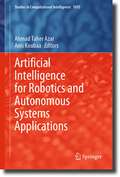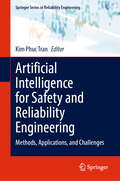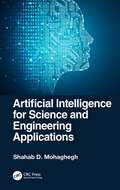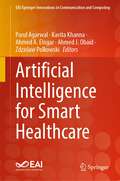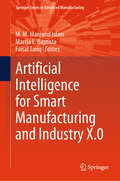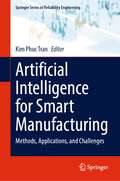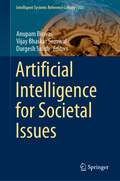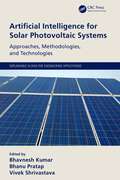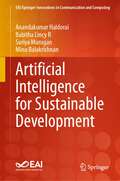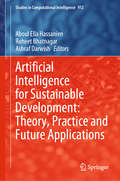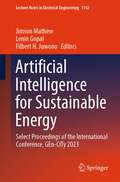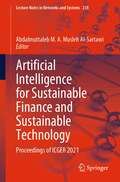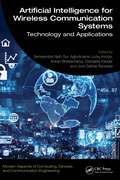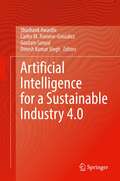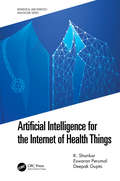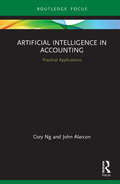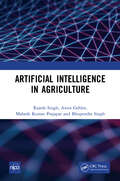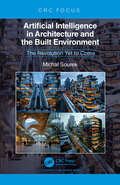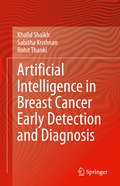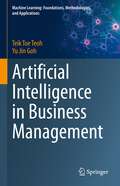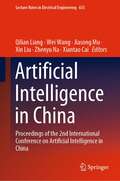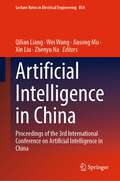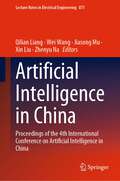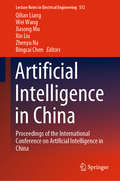- Table View
- List View
Artificial Intelligence for Robotics and Autonomous Systems Applications (Studies in Computational Intelligence #1093)
by Anis Koubaa Ahmad Taher AzarThis book addresses many applications of artificial intelligence in robotics, namely AI using visual and motional input. Robotic technology has made significant contributions to daily living, industrial uses, and medicinal applications. Machine learning, in particular, is critical for intelligent robots or unmanned/autonomous systems such as UAVs, UGVs, UUVs, cooperative robots, and so on. Humans are distinguished from animals by capacities such as receiving visual information, adjusting to uncertain circumstances, and making decisions to take action in a complex system. Significant progress has been made in robotics toward human-like intelligence; yet, there are still numerous unresolved issues. Deep learning, reinforcement learning, real-time learning, swarm intelligence, and other developing approaches such as tiny-ML have been developed in recent decades and used in robotics.Artificial intelligence is being integrated into robots in order to develop advanced robotics capable of performing multiple tasks and learning new things with a better perception of the environment, allowing robots to perform critical tasks with human-like vision to detect or recognize various objects. Intelligent robots have been successfully constructed using machine learning and deep learning AI technology. Robotics performance is improving as higher quality, and more precise machine learning processes are used to train computer vision models to recognize different things and carry out operations correctly with the desired outcome.We believe that the increasing demands and challenges offered by real-world robotic applications encourage academic research in both artificial intelligence and robotics. The goal of this book is to bring together scientists, specialists, and engineers from around the world to present and share their most recent research findings and new ideas on artificial intelligence in robotics.
Artificial Intelligence for Safety and Reliability Engineering: Methods, Applications, and Challenges (Springer Series in Reliability Engineering)
by Kim Phuc TranThis book is a comprehensive exploration of the latest theoretical research, technological advancements, and real-world applications of artificial intelligence (AI) for safety and reliability engineering. Smart manufacturing relies on predictive maintenance (PdM) to ensure sustainable production systems, and the integration of AI has become increasingly prevalent in this field. This book serves as a valuable resource for researchers, practitioners, and decision-makers in manufacturing. By combining theoretical research, practical applications, and case studies, it equips readers with the necessary knowledge and tools to implement AI for safety and reliability engineering effectively in smart manufacturing contexts.
Artificial Intelligence for Science and Engineering Applications
by Shahab D. MohagheghArtificial Intelligence (AI) is defined as the simulation of human intelligence through the mimicking of the human brain for analysis, modeling, and decision‑making. Science and engineering problem solving requires modeling of physical phenomena, and humans approach the solution of scientific and engineering problems differently from other problems. Artificial Intelligence for Science and Engineering Applications addresses the unique differences in how AI should be developed and used in science and engineering. Through the inclusion of definitions and detailed examples, this book describes the actual and realistic requirements as well as what characteristics must be avoided for correct and successful science and engineering applications of AI.This book:• Offers a brief history of AI and covers science and engineering applications• Explores the modeling of physical phenomena using AI• Discusses explainable AI (XAI) applications• Covers the ethics of AI in science and engineering• Features real‑world case studiesOffering a probing view into the unique nature of scientific and engineering exploration, this book will be of interest to generalists and experts looking to expand their understanding of how AI can better tackle and advance technology and developments in scientific and engineering disciplines.
Artificial Intelligence for Smart Healthcare (EAI/Springer Innovations in Communication and Computing)
by Zdzislaw Polkowski Ahmed A. Elngar Ahmed J. Obaid Parul Agarwal Kavita KhannaThis book provides information on interdependencies of medicine and telecommunications engineering and how the two must rely on each other to effectively function in this era. The book discusses new techniques for medical service improvisation such as clear-cut views on medical technologies. The authors provide chapters on communication essentiality in healthcare, processing of medical amenities using medical images, the importance of data and information technology in medicine, and machine learning and artificial intelligence in healthcare. Authors include researchers, academics, and professionals in the field.
Artificial Intelligence for Smart Manufacturing and Industry X.0 (Springer Series in Advanced Manufacturing)
by Faisal Tariq M. M. Manjurul Islam Marcia L. BaptistaThis book offers a foundational understanding of smart manufacturing (SM) and introduces effective AI methods tailored for smart manufacturing, including supervised, unsupervised, and reinforcement learning techniques. It also features real-world industrial case studies that demonstrate the practical applications of smart manufacturing. Drawing from the invaluable experiences gleaned from the aviation, healthcare, and semiconductors industries, this book provides an in-depth understanding of how AI is driving transformative changes in the manufacturing landscape. In the era of rapid technological advancements, the integration of AI into manufacturing processes has emerged as a game-changer. This book serves as an indispensable guide for navigating this transformation, presenting readers with a multidimensional perspective on the diverse applications, challenges, and opportunities that AI brings to the manufacturing sector. The book explores the emergence of Large Language Models (LLMs) as a valuable tool in manufacturing. It presents how LLMs, especially the GPT series, can process and generate textual data, offering potential applications in areas like smart manufacturing and big-data analysis. It contains detailed case studies, illustrating the practical implementation of smart manufacturing in different industries. The aviation, healthcare, automotive, and semiconductors sectors are examined, highlighting tangible benefits, challenges faced, and lessons learned from each domain. The book addresses the future prospects of Industry 4.0 and beyond—the interconnected, data-driven evolution of manufacturing. It examines the potential impact of emerging technologies such as the Industrial Internet of Things (IIoT), 5G, and advanced robotics on the manufacturing landscape. Challenges and future possibilities pertaining to research and advancement in smart manufacturing within the domains of Aviation, Semiconductors, and Healthcare sectors are also discussed. The chapters will be written in a tutorial style to allow early-career researchers and industry practitioners an in-depth understanding of the various topics. The book serves as a reference for researchers, engineers, and students seeking to understand the synergy between AI, Industry 4.0, LLMs, and real-world applications.
Artificial Intelligence for Smart Manufacturing: Methods, Applications, and Challenges (Springer Series in Reliability Engineering)
by Kim Phuc TranThis book provides readers with a comprehensive overview of the latest developments in the field of smart manufacturing, exploring theoretical research, technological advancements, and practical applications of AI approaches. With Industry 4.0 paving the way for intelligent systems and innovative technologies to enhance productivity and quality, the transition to Industry 5.0 has introduced a new concept known as augmented intelligence (AuI), combining artificial intelligence (AI) with human intelligence (HI).As the demand for smart manufacturing continues to grow, this book serves as a valuable resource for professionals and practitioners looking to stay up-to-date with the latest advancements in Industry 5.0. Covering a range of important topics such as product design, predictive maintenance, quality control, digital twin, wearable technology, quantum, and machine learning, the book also features insightful case studies that demonstrate the practical application of these tools in real-world scenarios.Overall, this book provides a comprehensive and up-to-date account of the latest advancements in smart manufacturing, offering readers a valuable resource for navigating the challenges and opportunities presented by Industry 5.0.
Artificial Intelligence for Societal Issues (Intelligent Systems Reference Library #231)
by Vijay Bhaskar Semwal Anupam Biswas Durgesh SinghArtificial intelligence (AI) has the potential to provide innovative solutions to various societal issues and real-world social challenges. AI is useful in combating some of the seemingly unsolvable social crises facing the world today. Be it disaster awareness and management or demand forecasting, or healthcare informatics or disease outbreaks like COVID-19, the AI plays a pivotal role everywhere. AI has the potential to address some of the societal issues that indirectly pose challenges like cybercrime, agriculture, education, economy, and health. The book covers several applications of AI as solutions to different societal issues, which include economic empowerment, smart education system, COVID-19 detection & management, emotion detection, fraudulent transactions, applications in agriculture and health informatics, etc. The book will be helpful for the academicians and researchers working with various areas of societal issues, data science, artificial intelligence, and machine learning.
Artificial Intelligence for Solar Photovoltaic Systems: Approaches, Methodologies, and Technologies (Explainable AI (XAI) for Engineering Applications)
by Bhavnesh KumarThis book provides a clear explanation of how to apply artificial intelligence (AI) to solve the challenges in solar photovoltaic technology. It introduces readers to new AI-based approaches and technologies that help manage and operate solar photovoltaic systems effectively. It also motivates readers to find new AI-based solutions for these challenges by providing a comprehensive collection of findings on AI techniques.It covers important topics including solar irradiance variability, solar power forecasting, solar irradiance forecasting, maximum power point tracking, hybrid algorithms, swarm optimization, evolutionary optimization, sensor-based sun- tracking systems, single-axis and dual-axis sun-tracking systems, smart metering, frequency regulation using AI, emerging multilevel inverter topologies, and voltage and reactive power control using AI.This book is useful for senior undergraduate students, graduate students, and academic researchers in areas such as electrical engineering, electronics and communication engineering, computer science, and renewable energy.
Artificial Intelligence for Sustainable Development (EAI/Springer Innovations in Communication and Computing)
by Anandakumar Haldorai Suriya Murugan Babitha Lincy R Minu BalakrishnanThis book delves into the synergy between AI and sustainability. This comprehensive guide illuminates the latest trends and cutting-edge techniques, offering invaluable insights for researchers, practitioners, and policymakers interested in the cross-section of AI and sustainability. The authors illustrate how AI-driven innovations are revolutionizing environmental conservation, urban planning, healthcare, and more. The book also considers the ethical considerations and governance frameworks crucial to harnessing AI's potential for global benefit. Whether a seasoned expert or a curious newcomer, this book empowers readers to navigate the dynamic landscape of AI and sustainability, paving the way for a more eco-conscious and equitable world.
Artificial Intelligence for Sustainable Development: Theory, Practice and Future Applications (Studies in Computational Intelligence #912)
by Ashraf Darwish Aboul Ella Hassanien Roheet BhatnagarThis book highlights the latest advances in the field of artificial intelligence and related technologies, with a special focus on sustainable development and environmentally friendly artificial intelligence applications. Discussing theory, applications and research, it covers all aspects of artificial intelligence in the context of sustainable development.
Artificial Intelligence for Sustainable Energy: Select Proceedings of the International Conference, GEn-CITy 2023 (Lecture Notes in Electrical Engineering #1142)
by Jimson Mathew Lenin Gopal Filbert H. JuwonoThis book presents select proceedings of the International Conference on Green Energy, Computing, and Intelligent Technology (GEn-CITy 2023) held at the University of Southampton Malaysia in July 2023. This book primarily covers clean energy and intelligent technologies for a sustainable future. This book serves as a forum for engineers, researchers, and specialists from academia, research centers, and industry worldwide to discuss and present the latest developments and applications related to the challenges of securing green and clean energy sources for the 21st century to protect the environment.
Artificial Intelligence for Sustainable Finance and Sustainable Technology: Proceedings of ICGER 2021 (Lecture Notes in Networks and Systems #423)
by Abdalmuttaleb M. A. Musleh Al-SartawiThis book shows latest research on artificial intelligence for sustainable technology. ICGER 2021 was organized by the Accounting, Finance and Banking Department at Ahlia University, Bahrain, and was conducted on the 15th and 16th of September. The strategic partners included the University of Jordan, the Bahrain Economists Society, the Association of Chartered Certified Accountants: ACCA, Al-Barka Banking Group and the International Computer Auditing Education Association: ICAEA . The theme of the ICGER 2021 centered around artificial intelligence for sustainable finance and sustainable technology. Accordingly, the papers presented at the conference provided a holistic view of sustainable finance, sustainability, AI, financial technology, cybersecurity, blockchain, CSR, and governance. This book, unlike ever before, brings together intelligence applications of new technologies and the sustainability requirements in the era of the digital economy, with special attention given to the opportunities, challenges, for education, business growth, and economic progression of nations which will help societies (economists, financial managers, engineers, ICT specialists, digital managers, data managers, policymakers, regulators, researchers, academics, and students) to better understand, use, and control AI applications and financial technologies to develop future strategies and to achieve sustainable development goals.
Artificial Intelligence for Wireless Communication Systems: Technology and Applications (Modern Aspects of Computing, Devices, and Communication Engineering)
by Debdatta Kandar Samarendra Nath Sur Agbotiname Lucky Imoize Jyoti Sekhar Banerjee Ankan BhattacharyaThe text provides a comprehensive study of the application of advanced artificial intelligence (AI) in next-generation wireless communications with a focus on theory, standardization, and core development. It further highlights AI-enabled intelligent architecture for sixth-generation (6G) networks to realize smart resource management, automatic network adjustment, and intelligent service layers. The book covers artificially assisted non-orthogonal multiple access schemes for 6G communication.This book: Discusses the use of AI in various aspects of wireless communications, including channel modeling, signal detection, channel coding design, and resource management Explores technical challenges in the ubiquitous fifth-generation (5G) wireless networks and the prospects of introducing artificial intelligence-based techniques in the envisioned 6G wireless networks Presents potential issues in AI-enabled approaches in wireless communications Covers AI-enabled energy efficiency optimization and cross-layer optimization in the next-generation wireless networks Explains artificially empowered security and privacy schemes in next-generation wireless networks and next-generation mobile management It is primarily written for senior undergraduates, graduate students, and academic researchers in the fields of electrical engineering, electronics and communication engineering, and computer engineering.
Artificial Intelligence for a Sustainable Industry 4.0
by Dinesh Kumar Singh Carlos M. Travieso-González Goutam Sanyal Shashank AwasthiThis book outlines the recent advancements in the field of artificial intelligence (AI) and addresses how useful it is in achieving truly sustainable solutions. The book also serves as a useful reference literature in developing sustainable engineering solutions to various social and techno-commercial issues of global significance. This book is organized into two sections: section 1 is focused on fundamentals and principles of AI to lay the groundwork for the second section. Section 2 explores the sustainable engineering solutions development using AI, which addresses challenges in various computing techniques and opportunities in engineering design for sustainable development using IoT/AI and smart cities. Applications include waste minimization, re-manufacturing, reuse and recycling technologies using IoT/AI, Industry 4.0, intelligent and smart grid systems, energy conservation using technology, and robotic process automation (RPA). The book is ideal for the engineers, researchers and students interested in how AI can aid in sustainable development applications.
Artificial Intelligence for the Internet of Health Things (Biomedical and Robotics Healthcare)
by Deepak Gupta K. Shankar Eswaran PerumalThis book discusses research in Artificial Intelligence for the Internet of Health Things. It investigates and explores the possible applications of machine learning, deep learning, soft computing, and evolutionary computing techniques in design, implementation, and optimization of challenging healthcare solutions. This book features a wide range of topics such as AI techniques, IoT, cloud, wearables, and secured data transmission. Written for a broad audience, this book will be useful for clinicians, health professionals, engineers, technology developers, IT consultants, researchers, and students interested in the AI-based healthcare applications. Provides a deeper understanding of key AI algorithms and their use and implementation within the wider healthcare sector Explores different disease diagnosis models using machine learning, deep learning, healthcare data analysis, including machine learning, and data mining and soft computing algorithms Discusses detailed IoT, wearables, and cloud-based disease diagnosis model for intelligent systems and healthcare Reviews different applications and challenges across the design, implementation, and management of intelligent systems and healthcare data networks Introduces a new applications and case studies across all areas of AI in healthcare data K. Shankar (Member, IEEE) is a Postdoctoral Fellow of the Department of Computer Applications, Alagappa University, Karaikudi, India. Eswaran Perumal is an Assistant Professor of the Department of Computer Applications, Alagappa University, Karaikudi, India. Dr. Deepak Gupta is an Assistant Professor of the Department Computer Science & Engineering, Maharaja Agrasen Institute of Technology (GGSIPU), Delhi, India.
Artificial Intelligence in Accounting: Practical Applications (ISSN)
by Cory Ng John AlarconArtificial Intelligence in Accounting: Practical Applications was written with a simple goal: to provide accountants with a foundational understanding of AI and its many business and accounting applications. It is meant to serve as a guide for identifying opportunities to implement AI initiatives to increase productivity and profitability. This book will help you answer questions about what AI is and how it is used in the accounting profession today. Offering practical guidance that you can leverage for your organization, this book provides an overview of essential AI concepts and technologies that accountants should know, such as machine learning, deep learning, and natural language processing. It also describes accounting-specific applications of robotic process automation and text mining. Illustrated with case studies and interviews with representatives from global professional services firms, this concise volume makes a significant contribution to examining the intersection of AI and the accounting profession. This innovative book also explores the challenges and ethical considerations of AI. It will be of great interest to accounting practitioners, researchers, educators, and students.
Artificial Intelligence in Accounting: Practical Applications (Routledge Focus on Business and Management)
by Cory Ng John AlarconArtificial Intelligence in Accounting: Practical Applications was written with a simple goal: to provide accountants with a foundational understanding of AI and its many business and accounting applications. It is meant to serve as a guide for identifying opportunities to implement AI initiatives to increase productivity and profitability. This book will help you answer questions about what AI is and how it is used in the accounting profession today. Offering practical guidance that you can leverage for your organization, this book provides an overview of essential AI concepts and technologies that accountants should know, such as machine learning, deep learning, and natural language processing. It also describes accounting-specific applications of robotic process automation and text mining. Illustrated with case studies and interviews with representatives from global professional services firms, this concise volume makes a significant contribution to examining the intersection of AI and the accounting profession. This innovative book also explores the challenges and ethical considerations of AI. It will be of great interest to accounting practitioners, researchers, educators, and students.
Artificial Intelligence in Agriculture
by Rajesh Singh Anita Gehlot Bhupendra Singh Mahesh Kumar PrajapatThis book is a platform for anyone who wishes to explore Artificial Intelligence in the field of agriculture from scratch or broaden their understanding and its uses. This book offers a practical, hands-on exploration of Artificial Intelligence, machine learning, deep Learning, computer vision and Expert system with proper examples to understand. This book also covers the basics of python with example so that any anyone can easily understand and utilize artificial intelligence in agriculture field. This book is divided into two parts wherein first part talks about the artificial intelligence and its impact in the agriculture with all its branches and their basics. The second part of the book is purely implementation of algorithms and use of different libraries of machine learning, deep learning and computer vision to build useful and sightful projects in real time which can be very useful for you to have better understanding of artificial intelligence. After reading this book, the reader will an understanding of what Artificial Intelligence is, where it is applicable, and what are its different branches, which can be useful in different scenarios. The reader will be familiar with the standard workflow for approaching and solving machine-learning problems, and how to address commonly encountered issues. The reader will be able to use Artificial Intelligence to tackle real-world problems ranging from crop health prediction to field surveillance analytics, classification to recognition of species of plants etc.Note: T&F does not sell or distribute the hardback in India, Pakistan, Nepal, Bhutan, Bangladesh and Sri Lanka. This title is co-published with NIPA.
Artificial Intelligence in Architecture and the Built Environment: The Revolution Yet to Come
by Michal SourekImagine if every architect had an apprentice who could consistently observe and understand their intentions, take over routine tasks and monitor technical, environmental, and economic constraints. This apprentice would continually improve, freeing the architect to concentrate on truly creative work.This book outlines a plan to turn this vision into reality. It evaluates the development of artificial intelligence from its inception to the present, focusing on the last two decades of applying AI in architectural design and planning; the current state of architectural practice is also examined. Integrating architecture, computer science, AI, robotics, economics, law, neurobiology, and philosophy, the vision is built on three key premises: (i) authentic, poetic creativity that transcends parameterization and algorithmizing, (ii) innovative learning strategies and training approaches not yet applied concerning architectural design, and (iii) the convergence of architecture’s inherent spatiality with virtual reality technology and new theories of human thinking and intelligence, poised for implementation in machine learning.
Artificial Intelligence in Breast Cancer Early Detection and Diagnosis
by Rohit Thanki Khalid Shaikh Sabitha KrishnanThis book provides an introduction to next generation smart screening technology for medical image analysis that combines artificial intelligence (AI) techniques with digital screening to develop innovative methods for detecting breast cancer. The authors begin with a discussion of breast cancer, its characteristics and symptoms, and the importance of early screening.They then provide insight on the role of artificial intelligence in global healthcare, screening methods for breast cancer using mammogram, ultrasound, and thermogram images, and the potential benefits of using AI-based systems for clinical screening to more accurately detect, diagnose, and treat breast cancer.Discusses various existing screening methods for breast cancerPresents deep information on artificial intelligence-based screening methods Discusses cancer treatment based on geographical differences and cultural characteristics
Artificial Intelligence in Business Management (Machine Learning: Foundations, Methodologies, and Applications)
by Teik Toe Teoh Yu Jin GohArtificial intelligence (AI) is rapidly gaining significance in the business world. With more and more organizations adopt AI technologies, there is a growing demand for business leaders, managers, and practitioners who can harness AI’s potential to improve operations, increase efficiency, and drive innovation. This book aims to help management professionals exploit the predictive powers of AI and demonstrate to AI practitioners how to apply their expertise in fundamental business operations. It showcases how AI technology innovations can enhance various aspects of business management, such as business strategy, finance, and marketing. Readers interested in AI for business management will find several topics of particular interest, including how AI can improve decision-making in business strategy, streamline operational processes, and enhance customer satisfaction. As AI becomes an increasingly important tool in the business world, this book offers valuable insights into how it can be applied to various industries and business settings. Through this book, readers will gain a better understanding of how AI can be applied to improve business management practices and practical guidance on how to implement AI projects in a business context. This book also provides practical guides on how to implement AI projects in a business context using Python programming. By reading this book, readers will be better equipped to make informed decisions about how to leverage AI for business success.
Artificial Intelligence in China: Proceedings of the 2nd International Conference on Artificial Intelligence in China (Lecture Notes in Electrical Engineering #653)
by Qilian Liang Wei Wang Jiasong Mu Xin Liu Zhenyu Na Xiantao CaiThis book brings together papers presented at The 2nd International Conference on Artificial Intelligence in China (ChinaAI) 2020, which provides a venue to disseminate the latest developments and to discuss the interactions and links between these multidisciplinary fields. Spanning topics covering all topics in artificial intelligence with new development in China, this book is aimed at undergraduate and graduate students in Electrical Engineering, Computer Science and Mathematics, researchers and engineers from academia and industry as well as government employees (such as NSF, DOD and DOE).
Artificial Intelligence in China: Proceedings of the 3rd International Conference on Artificial Intelligence in China (Lecture Notes in Electrical Engineering #854)
by Qilian Liang Wei Wang Jiasong Mu Xin Liu Zhenyu NaThis book brings together papers presented at the 3rd International Conference on Artificial Intelligence in China (ChinaAI), which provides a venue to disseminate the latest developments and to discuss the interactions and links between these multidisciplinary fields. Spanning topics covering all topics in Artificial Intelligence with new development in China, this book is aimed at undergraduate and graduate students in Electrical Engineering, Computer Science and Mathematics, researchers and engineers from academia and industry as well as government employees (such as NSF, DOD, DOE, etc).
Artificial Intelligence in China: Proceedings of the 4th International Conference on Artificial Intelligence in China (Lecture Notes in Electrical Engineering #871)
by Qilian Liang Wei Wang Jiasong Mu Xin Liu Zhenyu NaThis book brings together papers presented at the 4th International Conference on Artificial Intelligence in China (ChinaAI), Changbaishan, China, on July 23-24, 2022, which provides a venue to disseminate the latest developments and to discuss the interactions and links between these multidisciplinary fields. Spanning topics covering all topics in Artificial Intelligence with new development in China, this book is aimed at undergraduate and graduate students in Electrical Engineering, Computer Science and Mathematics, researchers and engineers from academia and industry as well as government employees (such as NSF, DOD, DOE, etc).
Artificial Intelligence in China: Proceedings of the International Conference on Artificial Intelligence in China (Lecture Notes in Electrical Engineering #572)
by Qilian Liang Wei Wang Jiasong Mu Xin Liu Zhenyu Na Bingcai ChenThis book brings together papers presented at the International Conference on Artificial Intelligence in China (ChinaAI) 2019, which provided a venue for disseminating the latest advances and discussing the interactions and links between the various subfields of AI. Addressing topics that cover virtually all aspects of AI and the latest developments in China, the book is chiefly intended for undergraduate and graduate students in Electrical Engineering, Computer Science, and Mathematics, for researchers and engineers from academia and industry, and for government employees (e.g. at the NSF, DOD, and DOE).
